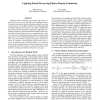Free Online Productivity Tools
i2Speak
i2Symbol
i2OCR
iTex2Img
iWeb2Print
iWeb2Shot
i2Type
iPdf2Split
iPdf2Merge
i2Bopomofo
i2Arabic
i2Style
i2Image
i2PDF
iLatex2Rtf
Sci2ools
94
Voted
PG
2007
IEEE
2007
IEEE
Lighting Details Preserving Photon Density Estimation
Standard density estimation approaches suffer from visible bias due to low-pass filtering of the lighting function. Therefore, most photon density estimation methods have been used primarily with inefficient Monte Carlo final gathering to achieve high-quality results for the indirect illumination. We present a density estimation technique for efficiently computing all-frequency global illumination in diffuse and moderately glossy scenes. In particular, we compute the direct, indirect, and caustics illumination during photon tracing from the light sources. Since the high frequencies in the illumination often arise from visibility changes and surface normal variations, we consider a kernel that takes these factors into account. To efficiently detect visibility changes, we introduce a hierarchical voxel data structure of the scene geometry, which is generated on GPU. Further, we preserve the surface orientation by computing the density estimation in ray space.
Computer Graphics | Density Estimation | PG 2007 | Photon Density Estimation | Standard Density Estimation |
Related Content
| Added | 04 Jun 2010 |
| Updated | 04 Jun 2010 |
| Type | Conference |
| Year | 2007 |
| Where | PG |
| Authors | Robert Herzog, Hans-Peter Seidel |
Comments (0)

